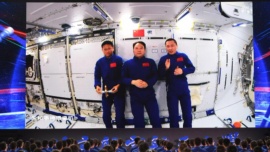In 2008, Bill Gates spoke at the World Economic Forum about “creative capitalism.” Gates encouraged companies to identify their expertise – be it technology, agriculture, healthcare – and develop products that could “stretch market forces.” A slightly more nuanced take on “doing good,” it meant honing in on the business’ specialty, not just throwing money at various charities.
After reviewing Gates’ speech the question arises: Can those principles be applied to Macau’s gaming operators? Is it merely about giving or does the kind of giving matter?
Since 2002, we have watched Macau gaming operators make a lot of money from their clients. It is well known that an important part of that money was used to finance a wide range of activities around the world such as political campaigns, businesses in other jurisdictions and others, but one needs to recognise that another relevant part of the gaming operators revenue – 39% to be precise – was immediately delivered to the Macau Government in the form of a special gaming tax.
Besides, and despite such compulsory contributions, is also fair to concede that local gaming operators have contributed to a significant number of non-profitable cultural, health, educational, sports and humanitarian organisations and events. That said, there is no doubt that regardless of the enormous amount made by the Macau operation, gaming concessionaires have shared their profits with the region. Nevertheless, if we compare Macau with other cities in the region we tend to ask ourselves if the said contributions were truly significant for Macau society or if it was just another “throwing of money” with no relevant effects?
Despite the ingratitude that my opinion may suggest at first glance, I really don’t think that the contributions paid by the gaming operators had a significant impact upon our society. Since 2002, I can only identify three public investments capable of adding significant and structural value to our region; namely, the new Macau University Campus, the new Ferry Terminal and the future Light Train System.
Of course, since the liberalisation of the gaming market the Macau Government has renovated various local infrastructures, started distributing cheques to residents, and built a significant amount of social housing – but honestly speaking, one doesn’t see any of those measures as capable of improving the living standards of our co-citizens and making a difference to Macau’s population..
This lack of impact is firstly a matter of responsibility of local authorities who have no capacity to stream the funds to the population’s needs and also a responsibility of all gaming operators who were not capable of developing programmes and projects in which their contributions could effectively benefit the most important stakeholders of the industry, the Macau citizen.
Under the rule of law, the consequence for the lack or absence of voluntary action is the enactment of laws that will force individuals and corporations to act (or react) in a certain manner. Perhaps we have reached the time to enact a legal Corporate Social Responsibility framework setting the terms and rules for the investment of gaming market contributions. From infrastructures to education, the Macau population is lacking a strategy for the investment and distribution of gaming industry proceeds.
A lot of time has been spent but with the issuance of new gaming licences there is still a lot to come . . . and to spend.
* Óscar Alberto Madureira




















